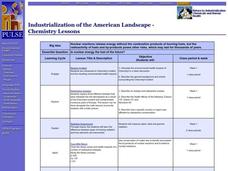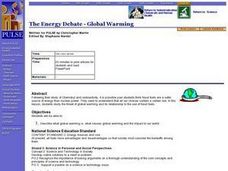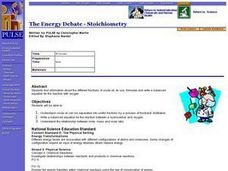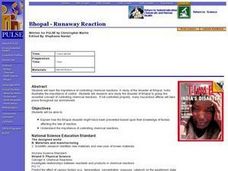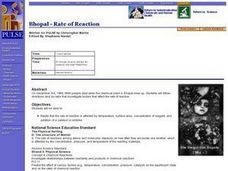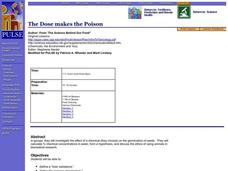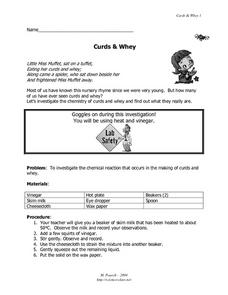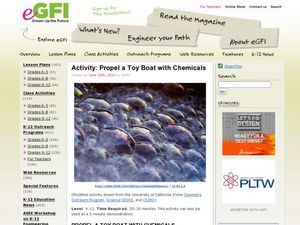Curated OER
Baking Soda and Vinegar Volcano
Students construct a volcano using baking soda and vinegar. In this earth science lesson, students explain the reaction that takes place when these two chemicals combine together.
Curated OER
Diaper Challenge
Students investigate the absorbency of certain diapers. In this inquiry lesson, students examine how much water the crystals absorb. They collect data and share their results in class.
Curated OER
Acids and Bases
Students use supporting evidence to predict if common household substances are acids or bases. They determine the pH of the substances and describe the results of the investigation and characteristics of each substance.
Curated OER
The Energy Debate - Energy of Peanut
Students articulate the difference between the terms heat and temperature. They calculate the amount of energy associated with a given temperature rise and design an experiment to measure the energy of a fuel.
Curated OER
Which Brand of Air Freshener is Most Cost Effective?
Learners use scientific method to determine cost-effectiveness of air freshener, and create PowerPoint presentations to share their results.
Curated OER
Acids and Bases: Together again!
Students identify principles behind acid-base reactions. They predict factors that may affect an acid-base reaction. Students identify questions and concepts that guide scientific investigations.
Curated OER
Industrialization of the American Landscape
Learners explore the Chernobyl incident and the resulting environmental health impacts. They explore three different isotopes that were released into the atmosphere. Through inquiry, students determine the difference between types of...
Curated OER
Radioactive Isotopes
Students describe an isotope and radioactive isotope in a written essay. They describe how a specific country or region was affected by radioactive contamination and attempt to sympathize with those affected by these radioactive...
Curated OER
Radioactivity Experiments
Young scholars study the difference between types of ionizing radiation and how elements are transmuted. They determine that radiation is normal and surrounds us. They calculate the amounts of alpha, beta and gamma radiation emitted...
Curated OER
The Energy Debate - Global Warming
Students describe what global warming is, what causes global warming and the impact to our world. They study the threat of global warming and its relationship to the use of fossil fuels.
Curated OER
The Energy Debate - Stoichiometry
Students determine crude oil can be separated into useful fractions by a process of fractional distillation. They write a balanced equation for the reaction between a hydrocarbon and oxygen.
Curated OER
Bhopal - Runaway Reaction
Students research and study the disaster of Bhopal to grasp the essential concept of controlling chemical reactions. They explain how the Bhopal disaster might have been prevented based upon their knowledge of factors affecting the rate...
Curated OER
Bhopal - Rate of Reaction
Students determine that the rate of reaction is affected by temperature, surface area, concentration of reagent, and addition of a catalyst or inhibitor. They observe that on December 3rd, 1984, 8000 people died when the chemical plant...
Curated OER
Fertilizers, Pesticides and Human Health
High schoolers define several vocabulary terms related to chemicals and toxicology. Students calculate chemical concentrations in water and explain the toxicological principles that govern safety of substances. High schoolers conduct an...
Curated OER
The Dose makes the Poison
Young scholars investigate the effect of a chemical (they choose) on the germination of seeds. They calculate % chemical concentrations in water, form a hypothesis, and discuss the ethics of using animals in biomedical research.
Curated OER
Activity #4 What Do Equations Mean?
Students practice with writing and balancing simple chemcial equations. they comprehend that chemical equations are a method of using a set of univeral symbols to represent what happens experimentally in chemical reactions. Pupils...
Curated OER
Curds and Whey
In this chemical reaction worksheet, students investigate the reaction that makes curds and whey. They mix milk and vinegar and run it through cheesecloth to collect the solid. Students make observations, read about curds and whey, and...
Curated OER
WS 5.5 Percent Composition
In this percent composition worksheet, students find the percentages of atoms in compounds and they determine empirical formulas given the percent of each atom in a compound.
Curated OER
Propel a Toy Boat with Chemicals
A simple cardboard or plastic boat is propelled across the surface of water when the surface tension is disrupted by adding detergent. Once youngsters see this in action, explain about the properties of water that make it possilbe:...
Virginia Department of Education
Formulas and Percent Compositions of Ionic Compounds
Try not to blind anyone with science by following the safety rules. The lesson encourages scholars to form an ionic compound from magnesium and chlorine. Then they determine the empirical formula and determine the mole ratio and percent...
Virginia Department of Education
Finding the Formula and Percent Composition
Do you have mole problems? If so, call Avogadro at 602-2140. The instructional activity starts with pupils working independently to solve for molar mass of ionic compounds. Then they learn to solve for percent composition and later...
Virginia Department of Education
Soap, Slime, and Creative Chromatography
Do you think chromatography paper suffers from separation anxiety? Young chemists make soap, slime, silly putty, and experiment with chromatography in this lesson. The material includes clear instructions for each experiment along with...
Virginia Department of Education
Molecular Model Building
During this hands-on activity, young chemists build molecular models based on the Lewis dot structure before studying valence shell electron pair repulsion theory.
Virginia Department of Education
Aspirin Analysis
Laughter may be the best medicine, but aspirin is also important. Young chemists analyze aspirin tablets using titration in this lab experiment. They then repeat the entire experiment using a different aspirin brand.
Other popular searches
- Organic Chemistry
- Chemistry Chemical Reactions
- Chemistry Periodic Table
- Chemistry Equations
- Chemistry of Life
- History of Chemistry
- Chemistry Lesson Plans
- Organic Chemistry Projects
- Food Chemistry
- Chemistry Current Events
- Chemistry of Soap
- Water Chemistry






